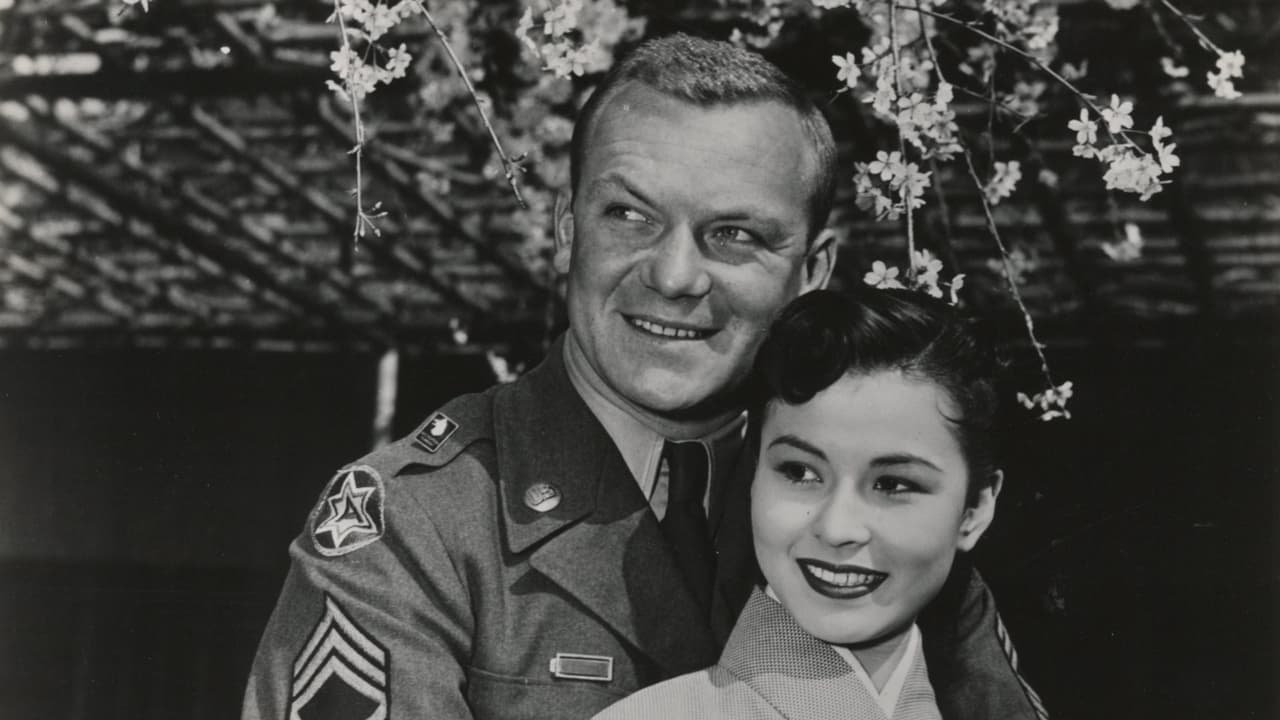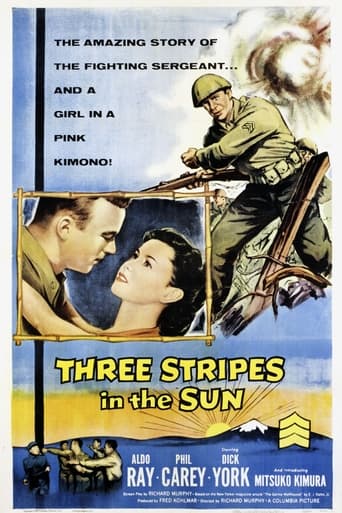



Disturbing yet enthralling
This movie feels like it was made purely to piss off people who want good shows
View MoreThe movie really just wants to entertain people.
A terrific literary drama and character piece that shows how the process of creating art can be seen differently by those doing it and those looking at it from the outside.
View MoreWhile this wasn't an Oscar movie, I enjoyed this charming film on TCM. I find Aldo Ray a very interesting actor. He defines that 40s/50s rugged charisma (John Wayne-type) that I think lends itself well to the true story of a WWII veteran being touched by a Japanese woman and Japanese orphans. I really didn't know he had romantic leading man roles even though its a bit of a stretch for him at times. The movie is sensitive in its treatment of the cultural differences between the Japanese and Americans without being demeaning or hokey. Although the musical South Pacific touched upon similar themes, this doesn't always seem to be typical of the era.Mitsuko Kimura was very good and endearing. I wonder of her acting career listed here was actually that limited. Philip Carey, Dick Sargent and Chuck Connors all were good in their supporting roles. It's kind of funny watching Chuck Connors pitch in a charity baseball game knowing he played professionally. Even though he did not pitch in the pros, it looks like he was laying off the fastball.I also find this era in post-war Japan to be fascinating. Here you see some of Osaka and the lights of downtown Tokyo from the early-50s. It's too bad this was not filmed in color because there is some beautiful scenery around the Kyoto era.Thank you to Alana O'Reilly and the Veterans here who give this story a personal face.
View MoreI'm writing this in reaction to some of the comments posted about this movie. Although this movie is a product of Hollywood, and therefore tends to be sickly sweet, I want to confirm that almost all of the story is true. My grandfather was nowhere near as racist as Aldo Ray's character in the beginning of the movie, but having fought in brutal conditions in the Pacific against a foreign enemy, he naturally felt great resentment against the Japanese people. Understandably, when he first arrived in Japan, he wanted very little to do with the Japanese people. However, when he first came across the devastated orphanage in Osaka, he knew immediately that he had to come to the aid of the children who were barely surviving in a war-torn nation. He did in fact steal food and medicine for the children, and started collecting donations from fellow soldiers. His efforts that had begun 60 years ago continue to this day, and the orphanage is still closely tied to the Wolfhounds. He also met and married my grandmother, Yuko, (who was the translator in the movie for the sake of the story). This movie should not just be taken at face value, but understood for its deeper meaning. My grandfather's story is just an example of the human connection between completely foreign people. People whose lives were destroyed by an unspeakably devastating war, still managed to surpass their hatred for one another, and find some peaceful middle ground.
View MoreIn 1949 Occupied Japan, a U.S. Army sergeant who despises the locals ultimately finds a soft spot in his heart while working with the nuns and children at a bedraggled orphanage, soon falling in love with a Japanese translator. Although this story is based upon fact, with the real-life protagonist Sgt. Hugh O'Reilly acting as technical adviser, one hesitates to swallow such a big lump of sugar. The film has been designed as a heart warmer, and yet--as bullet-chested, no-nonsense Aldo Ray plays O'Reilly--the character's complete transformation into an old softy is rather too good to be true. Ray, who got stuck in a revolving door of battle films during this period, isn't an animated actor on-screen, his personality mostly consisting of a stoic manliness; here, he strains to utilize his goofy laugh and dumb-mug smile to convince us he's just a big kid on the playground (one with love in his eyes). Ray is a decent actor, but this part would be a stretch for even the most accomplished performer. Buddy Dick York gets some second-banana laughs, Phil Carey is a by-the-books colonel whose heart eventually thaws, while the sisters and little ones are constantly around to milk the audience for the utmost treacly effect. I didn't believe a minute of it. ** from ****
View MoreHeartwarming tale, based on a true story. An American GI in Japan for the post WWII occupation hates the Japs, and is rather a grouch. But he falls in love with a Japanese orphanage worker and proceeds to do much to help the plight of the orphaned children. This includes actually stealing army supplies, and diverting them to the kids !The story doesn't fall into the trap of being soppy or sickly sweet, and the depiction of army life is pretty realistic. A feelgood story, very well done. Highly recommended.
View More